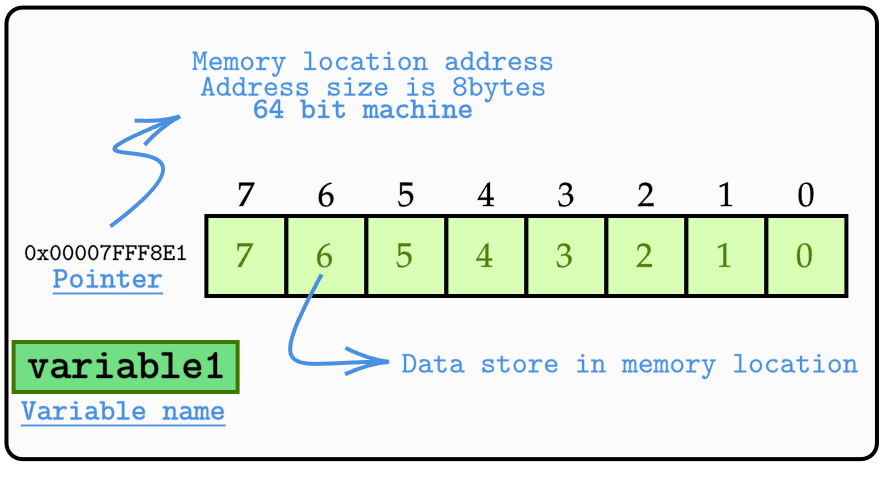Variables
Variables are identifiers for your data.
- Data is usually stored in computer memory.
- So, a variable acts as a label to a memory location where the data is stored.
- Variable names are not stored inside the computer memory, and the compiler replaces them with memory location addresses during data manipulation.
#include <stdio.h>
int main(){
\\ variableA and variableB are variables of type char
char variableA = 20;
char variableB = 30;
printf("Size = %d", sizeof( variableA ));
return 0;
}

The variable name just exists for programming convenience and doesn't exist post-compilation, only its associated memory location address does.
Before you use a variable, you have to define it.
Variable definition (sometimes also called a variable declaration) is nothing more than letting the compiler know you will need some memory space for your program data so it can reserve some.
- To define a variable, you only need to state its type, followed by a variable name.
<data type> <variable_name>;
Example
char mvExamScore; // This is called variable definition
Variable initialization
First define the variable, then initialize it with a value.
Example
char mvExamScore; // Variable definition
myExamScore = 25; // Variable initialization
Example
char mvExamScore = 25; // Other form of Variable definition
Variable definition vs. declaration
A variable is defined when the compiler generates instructions to allocate the storage for the variable.
A variable is declared when the compiler is informed that a variable exists along with its type. The compiler does not generate instructions to allocate the storage for the variable at that point.
A variable definition is also a declaration, but not all variable declarations are definitions.
Pure declaration example
#include <stdio.h>
extern int myVariable; // Pure declaration of a variable
int main(){
myVariable = 540;
printf("The variable has the value of %d", myVariable);
return 0;
}
Output
/usr/bin/ld: /tmp/ccnUJk4h.o: warning: relocation against `myVariable' in read-only section `.text'
/usr/bin/ld: /tmp/ccnUJk4h.o: in function `main':
main.c:(.text+0xa): undefined reference to `myVariable'
/usr/bin/ld: main.c:(.text+0x14): undefined reference to `myVariable'
/usr/bin/ld: warning: creating DT_TEXTREL in a PIE
collect2: error: ld returned 1 exit status
In this example, the compiler does not allocate memory to this variable so it can't use it in the main( ) function. This is because it thinks that the variable myVariable is defined in another file.
Definition example
#include <stdio.h>
int myVariable; // Definition (and declaration) of a variable
int main(){
myVariable = 540;
printf("The variable has the value of %d", myVariable);
return 0;
}
Output
The variable has the value of 540
Here, the compiler does indeed make use of the variable myVariable because it allocated memory for that. It is both defined and declared in this file.
-
The variable name shall not be more than 30 characters. Some compilers might throw some errors.
-
The variable name can only contain alphanumerical characters and underscores.
-
The first letter of the variable cannot be a digit. It should either be an alphanumerical character or an underscore.
-
You cannot use a C - Reserved keywords as variable names.
Variable scope
Scope: Within the body of the function. Local variables lose existence once the execution control comes out of the function body.
Default value: Unpredictable (garbage value).
Lifetime: Till the end of the execution of a function in which a variable is defined.
Example
#include <stdio.h>
void myFunc(void){
int myVariable; // Declaration of a local variable
return 0;
}
int main(){
printf("The variable has the value of %d", myVariable);
return 0;
}
Output
main.c: In function ‘myFunc’:
main.c:13:16: warning: ‘return’ with a value, in function returning void
13 | return 0;
| ^
main.c:11:6: note: declared here
11 | void myFunc(void){
| ^~~~~~
main.c: In function ‘main’:
main.c:18:52: error: ‘myVariable’ undeclared (first use in this function)
18 | printf("The variable has the value of %d", myVariable);
| ^~~~~~~~~~
main.c:18:52: note: each undeclared identifier is reported only once for each function it appears in
The main() function can't access the local variable created in the myFunc() function scope.
Scope: Global variables are visible to all the function of a program. They are everywhere and can be accessed from another file of the project.
Default value: All uninitialized global variables will have 0 as a default value.
Lifetime: Till the end of the execution of the program.
Example
#include <stdio.h>
int myVariable; // Declaration of a global variable
int main(){
myVariable = 540;
printf("The variable has the value of %d", myVariable);
return 0;
}
Output
The variable has the value of 540
No error at all!